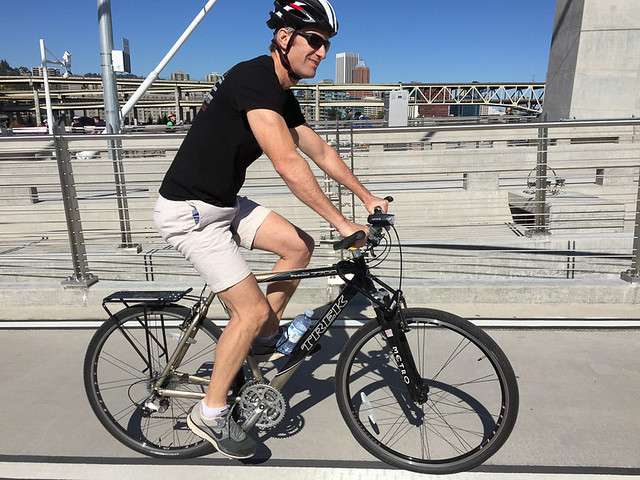
(Photo: J.Maus/BikePortland
Portland’s next mayor is a Multnomah County commissioner turned state treasurer who embraced protected bike lanes and more neighborhood greenway traffic diverters from almost the start of his run for office.
Ted Wheeler was drawing 58 percent of Portland’s primary vote Tuesday night, easily defeating opponents Jules Bailey and Sarah Iannarone, among others.
Wheeler also set himself apart on transportation issues by endorsing a local gas tax to improve Portland streets on the day he announced his campaign — a position that rapidly became conventional wisdom among local politicians and won a narrow victory Tuesday night.
“Portland is unique,” Wheeler said in his victory speech. “Portland’s on the move. Portland’s best years are still ahead of it.”
Bailey drew 16 percent of the vote, Iannarone 10 percent. Bruce Broussard, who didn’t make it to any candidates’ forum we saw but distinguished himself on transportation issues by speaking out against a redesign of Foster Road intended to improve safety by replacing two passing lanes with a center turn lane and bike lanes, was in fourth place with 4 percent, followed (in descending order) by Sean Davis, David Schor and Patty Burkett.
Novick will head to runoff in November
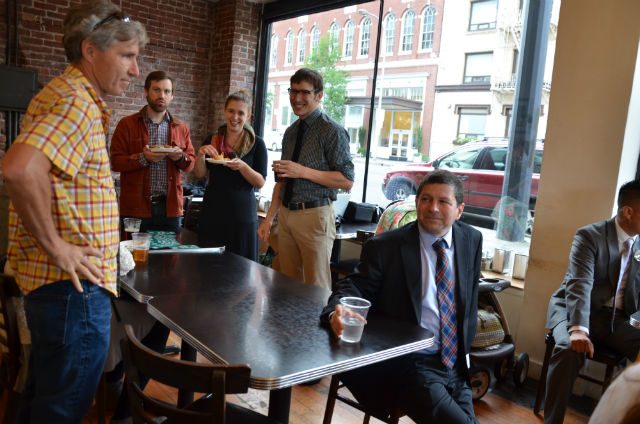
(Photo: M.Andersen/BikePortland)
The gas tax package, which included promised biking and walking improvements in every quadrant of the city as well as pavement repairs for various crumbling streets, was up by 4,268 votes as of 12:30 a.m. Wednesday, enough for 51.6 percent of the vote and enough for The Oregonian to call the race.
With 43 percent of the vote in his race, Portland Transportation Commissioner Steve Novick looks to be headed to a runoff with either architect Stuart Emmons or bookseller Chloe Eudaly. Emmons was slightly ahead of Eudaly Tuesday night, with 15 percent of the vote to her 13 percent.
Novick has been a solidly pro-biking vote on the Portland City Council, though he’s never made it one of his signature issues. He’s also established himself as probably the most vocal progressive on parking policy, speaking in favor of demand-based pricing, and on housing infill, which he has called essential to affordability in the city.
Emmons and Eudaly haven’t gone out of their way to stake out positions on bicycling, though Emmons did send us a photo of himself biking the Eastbank Esplanade a few months ago. On his website, his only stated position on transportation is that “our streets need attention.” Eudaly has made housing affordability, especially for tenants, her signature issue. Whichever of them comes out ahead, expect more coverage of this race in the coming months.
“It looks to me like I’m probably going to a runoff in November against the Oregonian editorial board, which is fine,” Novick told attendees of his election-night party. The newspaper’s editorial board has been a particular foe of Novick’s, endorsing Emmons and being the only local significant media outlet to oppose the gas tax he championed.
Wheeler win could start to reshape City Hall this year
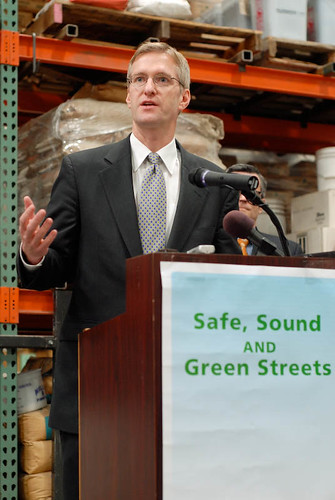
2008 event calling for new local transportation funding.
(Photos: J.Maus/BikePortland)
Wheeler’s election is likely to immediately reduce Mayor Charlie Hales’ influence on the city council as commissioners maneuver for good relationships with Wheeler. In Portland’s unusual system of government, the mayor’s only significant power over his other commissioners is the ability to assign them administrative power over the city’s various bureaus.
Last year, Wheeler reportedly told an Oregonian columnist that he wanted to take the city’s transportation bureau for himself. In a March interview with BikePortland, he described that as an “offhand comment” and that he wouldn’t make any such commitements.
Also at stake: the city council is approaching a series of crucial votes on its comprehensive plan this summer. The plan, which shapes the city’s zoning maps, pits advocates of infill and housing supply against people who oppose changes to Portland’s physical appearance.
Here’s how we summarized our 45-minute conversation with Wheeler last March:
• Like his opponents, he supports expansion of protected bike lanes and neighborhood greenways. Though he backs the gas tax ballot issue, he thinks it won’t raise enough for those projects to make the investments he thinks are needed.
• Though the Portland Business Alliance, the regional chamber of commerce, announced its endorsement of Wheeler the day we spoke, Wheeler said he’s never discussed transportation policy with them. He said he does not agree with the notion (sometimes expressed by the PBA) that auto capacity should not be reduced on major arterials.
• He stepped back from a previously reported statement that as mayor he would take the transportation bureau; he said that was an “offhand conversation” and he’s made no decisions.
• His plan for transportation funding is to pass a gas tax in the short run, then get the 2017 state legislature to allocate more state and federal road taxes to cities like Portland. In the long run, he doesn’t think the city should let any of its pavement degrade, and thinks the city needs incremental steps to improve its credibility among voters.
• His first priority for all transportation investments is safety improvements east of 82nd Avenue. He doesn’t think all new transportation investment should happen there but he thinks East Portland should get the large majority to make up for decades of underinvestment.
• Though he supports increasing housing density by re-legalizing duplexes and garden apartments in residential zones, he thinks there’s some validity to the argument that new tall buildings can make nearby housing more expensive. He doesn’t see a tradeoff between “historic preservation,” which he values, and keeping housing affordable.
• Unlike his opponent Jules Bailey, Wheeler sees “training” as inadequate to addressing apparent racial profiling of people biking and walking by officers in the Portland Police Bureau. Deeper cultural change in the bureau is necessary, he said.
Other races
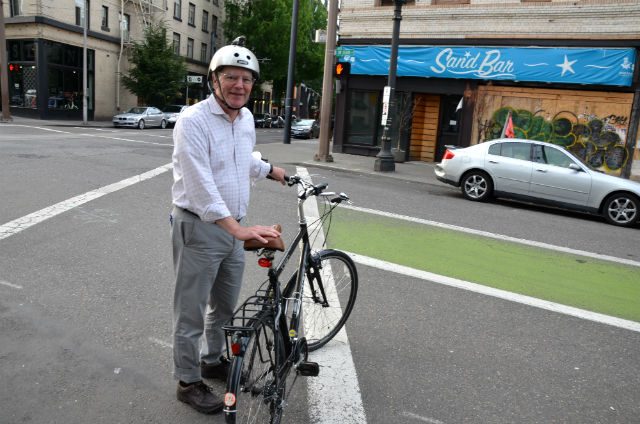
Also Tuesday, Commissioner Amanda Fritz and incumbent Gov. Kate Brown won in anticipated landslides, Fritz with 70 percent of the city vote. Jessica Vega Pederson, who had a pro-biking record as state legislator, was elected to the Multnomah County Commission in an uncontested race in southeast Portland. Karin Power, who won a seat on Milwaukie’s city council two years ago on a pro-biking platform and has helped lead that city’s recent political embrace of biking, won an uncontested Democratic primary in the 41st legislative district.
Brown, a Democrat, will face Bud Pierce, a Republican legislator who has promised to “end gridlock once and for all” by adding lanes to every “major freeway.”
Metro Councilor Bob Stacey, a longtime bike commuter who is maybe the single most pro-bike politician in the region, was elected to a second four-year term to represent southeast Portland in the regional government. His colleague Sam Chase, who represents inner northeast, north and northwest Portland and took the lead on Metro’s recent work to approve mountain-biking trails on public land north of Forest Park, coasted to reelection with 77 percent against Colby Clipston.
In Bailey’s county commissioner district in inner southeast and west Portland, Sharon Meieran and Eric Zimmerman are headed to a runoff. The same is true for Lori Stegmann and Amanda Schroeder in Gresham and east county. (Expect BikePortland coverage of these county races, which will shape the future of the Burnside Bridge and Sauvie Island, in the months to come.)
Gas tax work could start in fall
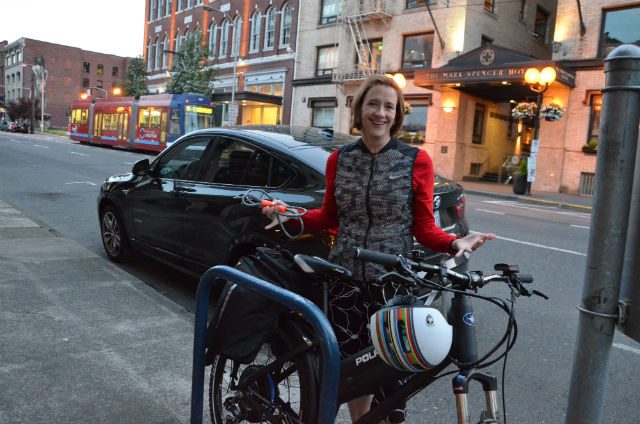
The four-year, 10-cent-per-gallon gas tax will raise an estimated $16 million for each of the next four years, of which 44 percent would be earmarked for safety improvements to local streets — mostly improvements for walking and biking.
Among other things — including various sidewalk and crosswalk upgrades around the city — the project list includes new funding for protected bike lanes in downtown Portland; two neighborhood greenways connecting much of East Portland to the Gateway Transit Center; a neighborhood greenway on NE 7th and/or 9th Avenue in inner northeast Portland; a neighborhood greenway on NW/SW 20th Avenue connecting the Northwest District to Goose Hollow; and $2 million a year for biking and walking improvements near schools, which would be chosen in partnership with local school districts.
In an interview Tuesday night, Portland Transportation Director Leah Treat said that gas tax money will start to arrive in “late fall.” The city will then be able to start paving selected streets and to start planning the first round of safety improvements.
“We’re ready to get to work,” Treat said.
Correction 10 am: A previous version of this post got Ted Wheeler’s current job wrong. He’s the state treasurer. We regret the error; it was a long night.
— Michael Andersen, (503) 333-7824 – michael@bikeportland.org
Our work is supported by subscribers. Please become one today.



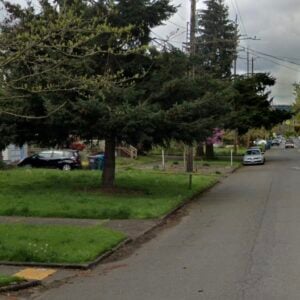
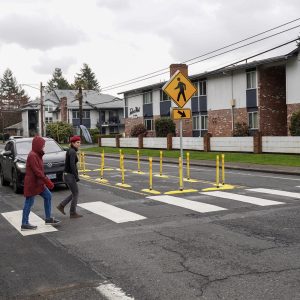


Thanks for reading.
BikePortland has served this community with independent community journalism since 2005. We rely on subscriptions from readers like you to survive. Your financial support is vital in keeping this valuable resource alive and well.
Please subscribe today to strengthen and expand our work.
I certainly hope that Wheeler doesn’t give SN a free rein like Charlie did .. 🙁
Wheeler will report to the same folks that Hales did. Have fun!
“As of 10 p.m., Multnomah County counted 63,073 votes in favor of the gas tax and 59,418 opposed.”
From the curiously dated Tribune (Created on Thursday, 19 May 2016 02:00)
http://portlandtribune.com/pt/9-news/307197-184915-portland-voters-narrowly-approving-city-gas-tax
“official city vehicle, an e-bike” O_o Is there a fleet, or just one? I’m looking forward to seeing staff riding an e-bike at speed on their designs.
Leah Treat – still with a cable lock? Didn’t her last two cable-locked bikes get stolen?
That’s just a accessory cable; there is no lock included. It’s the sort you loop through the wheel and attach to a U-lock for extra security.
The trick is to use a really sturdy knot.
I voted for Wheeler. I will keep my fingers crossed. Best of luck.
…with this mess of a city, I mean.
I didn’t… I like runoffs.
I’ll race yuh! Meet me sometime in fall. From that telephone pole to the tree over there. 10 yard dash!
I’m glad that the gas tax has probably passed, but it’s disappointing how narrow a victory it looks to be for such a small measure. The tax will raise $64 million over 4 years. By contrast Seattle voters recently approved the Move Seattle measure, by 58.67% for to 41.33% against. Move Seattle will raise $930 million over 9 years.
Adjusted for population and time, Portland’s transportation measure raises $26 per person, per year. Seattle’s raises $158 per person, per year.
It’s even more depressing when we look at Metro’s plans for expanding our regional high capacity transit network. Powell-Division is a joke, and SW Corridor will skip OHSU out of concerns related to the cost of tunneling. Meanwhile Sound Transit is preparing to ask Seattle metro area voters to approve $27 billion in new taxes, which would help fund $50 billion in new projects.
The Light Rail plan for SW Portland will go right past ohsu, but far below it. Even if the station were right under the hospital it would still need long elevators. The exact route isn’t set, but a station at Barbur can be connected to the top of the hill by escalators, a funnicular or something similar. This is cheaper and better than tunneling right under the hill, and will still provide a reliable and fast connection.
http://www.oregonmetro.gov/sites/default/files/SWCP-Draft-Proposed-Range-of-Alternatives-20160513.pdf
In what world is a forced transfer to an incline railway “better” than direct access by a deep-level tube for the city’s biggest employer? How many more novel modes of transit does Portland need to complete its Bingo card?
Metro could have revolutionized transit mobility in SW with a tunnel to Hillsdale and OHSU but instead will now set up a fight with ODOT over the right to build 35-mph light rail on Barbur that doesn’t serve any walkable town centers in SW.
Barbur needs new bridges over the Vermont and Newburry sections.
All absolutely true. But I have to admit the potential for a funicular in Portland makes me want to dust the alpine horn off and stand at an angle.
Sadly, my childhood lederhosen no longer fit 🙁
🙂
Yes yes yes – a bike funicular for the west hills and covered pedestrian escalators for other grades!
An outdoor escalator will have similar travel time as an elevator or long escalator from a subway station. And it will save hundreds of millions in construction costs.
Doubtful, especially if you have to cross Barbur to get to the station. Terwiliger on top of the hill too. Let’s see if they even build this thing.
Hillsdale could be a walkable town center if we got rid of the parking lots and 5-lane highway. Meanwhile, none of the 2025 SW corridor plan is designing for where we actually need to be in 2025. They’re not even planning protected bike lanes on Barbur because the state would want a breakdown lane for cars, which are important.
I’m skeptical that any surface connection up Marquam Hill can be as quick as a set of escalators/elevators from an underground station would have been. Even crossing Barbur on foot at grade is likely to involve a large time penalty. I’ll be very happy if I’m wrong though.
Elevator to mid-air tram stop and/or trebuchet + zip line.
Water slides!?!
If it could be done for connecting the Couve to downtown it probably wouldn’t be that hard to swallow for Pill Hill.
A trebuchet!! This is my favorite idea of all. 🙂
Funicular (diagonal elevator), straight up the gibbs ROW from Barbur, over Terwilliger and into the building.
ST3 has its own problems, what with Ballard supposedly not getting light rail until the year 2038, and Sound Transit instead wasting money trying to get as far into the hinterlands as possible.
But yes, everything that has transpired here the past year has reaffirmed Portland’s status as a small-time city. A big town, at best. I’m skeptical that Wheeler will be the champion for urbanism and safe streets that we’re looking for, but I’ll hold out some hope.
SW Corridor needs an escalator from Barbur to Terwilliger.
The gas tax will raise $15-17 million per year, for 4 years. I have no idea where you got the $4 million figure. Granted it isn’t as much as Seattle, but then it is far from being as regressive as Seattle’s tax, which is based upon sales tax.
Who said anything about $4 million?
And Move Seattle is a property tax measure, not a sales tax measure.
Sorry, I misread maccoinnich’s original text. My bad. He said $64 mil, not $4 mil.
… and to eat a bit more humble pie on my part, you are of course right about it being a property tax, and not a sales tax, which would be impossible to implement here in Oregon, given our 1992 restrictions of property tax increases, rates, and compression issues. Good for Seattle, I’m impressed. (I still wonder how Washington was able to avoid the property tax rebellion that Oregon & California still suffer from.)
Thank you for correcting me. I very much appreciate it!
Oregon property tax law is so Byzantine it’s difficult to follow…. but I don’t think the City (or Metro, or TriMet) would be prohibited from raising funding levels by way of a voter approved property tax measure. And now that real market values are going much faster than assessed values I don’t think compression is as much an issue as it would have been, say, 5 years ago.
Increase in Real Market Value (RMV) avoids some of the compression issues associated with Measure 5, which limits the total tax as a percentage of RMV.
But Measures 47/50 cause compression regardless. They limit property tax increases to 3% per year, regardless of change in RMV. So a new levy would get become part of the new total tax assessment, but that total assessment can’t increase more than 3% from the previous year–thereby causing compression.
This isn’t something I have a great understanding of, but I think the 3% rule doesn’t apply to voter applied levies so long as the real market values are high enough to take the property out of compression. As an example, a lot of people’s property tax rates went up a lot more than 3% after the passage of the 2012 schools bond. (The property that I rent saw a 17% jump between 2012 and 2013).
It’s hard for me to worry too much about the regressiveness of a gas tax. I want a (much) higher gas tax, which seems to be more palatable than a carbon tax.
huh, maybe if our city government hadn’t misappropriated other transportation funds in the past for wasteful, unneeded projects, we’d have a little more inclination to provide them with more of our money.
Examples?
I listened to a Novick interview on OPB last night and he sounded like the most arrogant and condescending politician that I have ever heard. It is really too bad that once you are elected to Portland city council it is essentially a job for life. We have a pathetic city council and regardless of how poorly they do their job they are re-elected.
All elected politicians I’ve met have, much like professional bicyclists, egos the size of small planets. That said, Steve is a pretty nice guy on a one-on-one basis or in a small group.
I couldn’t disagree more. I actually went and found the interview and he doesn’t come across that way to me at all. Confident (he got 3x as many votes as his nearest competitor) and precise in his language, yes, but in no way did I find hime arrogant or condescending.
For those who would like to judge for themselves, here’s the link to the program in question:
https://soundcloud.com/thinkoutloudopb/opb-election-night-special-1#t=14:51
And here’s the link to the entire two hour program:
http://www.opb.org/radio/programs/thinkoutloud/segment/opbs-election-night-special-wins-for-kate-brown-bud-pierce-ted-wheeler-bernie-sanders/
I suggest you go talk with him. Call his office and set up an appointment. Really, he’s quite personable.
Mind you, I no longer live in Oregon, so I can’t vote for him (bummer!), and there’s nothing in it for me to endorse him, but I’ve met him several times, and he’s really quite nice and interesting. He does get noticeably nervous around the press, though, so your comments may be reasonable in such a setting and context.
The Oregonian claimed the other day that passage of the gas tax would kill off any chance of getting a statewide transportation bill passed in Salem next year. Let’s see if they’re right or wrong. Hopefully the latter.
Also of note: a bill blocking the proposed Nestlé bottled-water plant in Hood River County passed handily, effectively killing off the project.
The Oregonian was great! All I pretty much had to do was read all of their voter picks, and vote the diametric opposite!!
I don’t think it makes much difference. Many Oregon cities and a few counties already had local gas taxes, Portland is simply the newest.
I do expect (unfortunately) that the Oregon legislature will use the CRC as one of the selling point projects; it is as popular state-wide as it is unpopular in Portland.
“…Also of note: a bill blocking the proposed Nestlé bottled-water plant in Hood River County passed handily, effectively killing off the project.” sanders
That’s a blessing. Nestle can go somewhere else to work on proliferating the planet with more plastic bottles.
Didn’t happen to read the O article claiming Portland’s gas tax would ditch chances for a statewide transportation bill. Could be that residents outside of the big metro area cities may be letting out a sigh of relief that Portland is doing something to deal with its own road maintenance problems, rather than waiting around hoping for some more state or fed money to get that work done.
I know it’s very exciting you are getting more of “other people’s money” to play with, but I wonder how much of this gas tax money will get funneled away for pet projects? Who exactly is on this oversight committee?
What is a pet project? Is that something that you don’t use?
Cycle lanes for dogs.
Protected, I hope.
Fenced off, so they can enjoy the company of other Canine-American cyclists.
example: the water bureau’s “concept home” the city sold for a loss.
you paid for it. the government lost it.
What percentage of ODOT’s 5 billion dollar budget is “other people’s” money?
Since direct user fees only account for 48% percent of ODOT’s budget. How much, roughly (say rounded to the nearest 10 million dollars) would you say that funds from general taxes that we all pay is “other people’s” money?
ODOT’s state revenue comes from:
• tax on motor fuels or gas (22 percent);
• bond proceeds (21 percent);
• weight-mile tax (paid by freight operators) (12 percent);
• driver and vehicle licenses and fees (14 percent)
Source:
https://www.oregon.gov/ODOT/COMM/docs/budgetbooklet_11-13.pdf.
I’m disappointed that Sarah came in third and didn’t force a runoff. She should definitely run again for Commissioner in two years!
Overall, I think Ted Wheeler could be good for bikes. He seems like he understands the economics of bike infrastructure, even mentioning protected bike lanes in business districts! Convincing people we need bike infra hasn’t gone well in the past, but perhaps the new mayor can get more people onboard using the different angle of economics. We need to make sure we keep up pressure on him from the beginning!
I’m really surprised that the gas tax was so close! I expected it to win by a larger margin considering all the organizations that endorsed it, including the country’s largest lobby org, AARP! Looking forward to seeing the projects PBOT’s been talking about for the last four years finally put on the ground!
Sarah > Amanda
I would love to see her run against Fritz in the next cycle. She was not ready to be mayor.
Agreed- I wish she had run for the spot. Fritz’s seat is the only race I refused to vote for anyone because I couldn’t bring myself to vote for her, but didn’t like the other two candidates as well. It would have been so nice to see Sarah run for that seat and start building her political coalitions.
I wrote in my sister. Very disappointed there were no real challengers for Fritz’s position.
I don’t know. That Chemtrails guy had some pretty convincing arguments…
Hah! Compelling—yes. 😉
What was wrong with Sanderson?
Well she was leading the opposition to the street fee so I interpreted wasn’t much of a friend to multimodal investments.
Except she was doing so because the small business portion to it was very poorly planned.
There were also quite a few pro-multimodal investment folks (including many on this site) that were also against the poorly conceived and constantly shifting street fee.
In my understand she was for the gas tax.
According to the ordinance, the gas tax kicks in after September 1st of this year. The City will then likely issue bonds for $50-$58 million or so, to paid back from the revenue raised, then start construction of projects in the following April of 2017. Naturally, East Portland projects will be done last, in 2021, if at all.
Agreed. I voted Sarah. I will say I’m impressed that she garnered 10%. I believe the WW said she was running at about 2% as of 2 weeks ago. That’s a big chunk of the undecided vote she pulled in, and should give her optimism should she decide to try again.
don’t hold your breath. tax sunsets in 4 years and $64M won’t do much besides basic maintenance.
Hopefully Wheeler can rise above the last two toxic mayors the city had to endure. Hopefully Hales doesn’t burn down everything around him in the next several months. He was apparently stung by Wheeler getting into the race….
Not directly BikePortland related, but where does our new mayor stand on homelessness, and the awfulness of the monster camps along the Springwater, etc?
I am really looking forward to much stricter enforcement of the sidewalk camping rules, and a clampdown on the lawlessness and lack of safety associated with them – including stolen bikes. Charlie Hales did such a c****y job at all of this, it made my blood boil.
And I hope that Wheeler stops the ineffectual, punitive, and wasteful sweeps. The millions we spend on whack-a-mole police overtime could be better spent on housing.
Um, no actually. I hope he increases the sweeps. Alternatively, why don’t we move all of the camps to YOUR residential street, and YOU can walk your kids, your wife, and your pets through urine soaked mattresses, piles of rotting discarded trash, stolen mail, and used heroin needles, all while getting verbally abused by a gang of meth-heads dismembering stolen bikes.
Let us know your address – we might as well start today!
soren, I don’t think it is at all appropriate that you refer to these poor, houseless individuals as “moles” even if they do have huge piles of stolen stuff and have completely trashed the Springwater corridor and other public facilities and exhibit enough threatening behavior that discourages citizens from using public parks and transportation corridors.
Not sure if you’re being sarcastic or not, but the term “whack-a-mole” refers to the practice of addressing issues as they pop up (as in the eponymous arcade game) instead of addressing the root problem.
And the eponymous arcade game was inspired by futile efforts to keep unwanted, multiplying visitors out of one’s backyard. So what’s your point?
Sweeps are futile measures whose aim is to keep unwanted and multiplying human beings out of unempathetic and classist people’s backyards.
PS: It’s called metaphor: http://lmgtfy.com/?q=metaphor
Pretty sure he was being sarcastic, yup.
So you are not only metaphor challenged but you are apparently unable to comprehend the second part that sentence: “could be better spent on housing.” Obviously, I believe the houseless should not be treated like the plastic moles in the “whack-a-mole” arcade game but this is precisely what the policies Adam supports accomplish. Sweeps are dehumanizing, punitive, and do nothing to address houselessness. They are exactly like playing whack-a-mole but with human beings instead of plastic game pieces.
These people are severely demoralized, not “evil”. They’re nihilistic because they have completely lost hope in themselves. It is tempting to see them as zombies because it externalizes the problem. But any one of us could end up exactly like them. We aren’t any different, really. Start understanding that, and you might be on the road to seeing the situation constructively.
Since we’re not willing to fund free housing for everyone who wants it, cleaning up after people who will not clean up after themselves is still going to be a reality.
From his post election statement this morning.
“I am not convinced the tent-camping policy is working,” he said. “I don’t think it’s a particularly compassionate approach to those living on our streets, and I don’t think it’s particularly fair to neighborhoods or to businesses.”
He said the city should focus instead on “programs that really move people from the streets” into jobs and housing.
In other words, he has no policy….
Of course he doesn’t… it’s an essentially unsolvable problem at the city level without a massive increase in resources. Look how much heartburn the tiny increase in gas tax caused.
It is solvable but will required assistance from the feds. the last time I checked we have (2) US Senators that the mayor should lean on to procure federal funding for what is in essence a refugee problem. Hales was too lazy or lame to seek funding, hopefully Wheeler will do the job.
Do you really think Hales didn’t ask for money? He’d have been terribly remiss if there was an available funding source left on the table. I think the reality is that the feds are not offering more assistance than what we’re getting (if any).
IF Blumenouer, Merkley and Ron Wyden cannot come up with some scraps of federal funding for largest city in the state they represent, for a pretty serious refugee/drug/homeless poverty problem, they are as useless as Repubs say they are…….
That’s why I’m supporting Trump. He’ll build a wall, and make the homeless pay for it!
A massive increase in the small levels of current funding is hardly a challenge.
“not that Mark” posted below that it would cost $1bn to solve the problem… I think that sort of massive increase would be a bit of a challenge. Anything would help, but a few million won’t go very far.
Just relieved to hear him–and Portland official–even utter the phrase “…and I don’t think it’s particularly fair to neighborhoods or to businesses.” That’s a first.
(oops–that’s meant to be “any Portland official.”)
So the gas tax includes $2,834,759 for “Central City; fill out the protected bike lane network identified in the Multi-Modal project”. That’s on top of the $6 million in Federal funds already allocated to the project. Does anyone know when planning on this is meant to start, and why it is so delayed?
My guess is that PBOT staff have been designing it for years now (various versions), but it would be best to ask Art Pearce or Leah Treat about it.
Time for me to exit and head out to the Greensboro “Ride of Silence” that starts in an hour (EDT). I hope y’all do the same in Portland tonight!
All of my family and many friends voted “no” on the gas tax, not because we were opposed to it, but because we have zero confidence in our City to actually put pavement down and make the safety improvements they talk about. After the “Street Fee” fustercluck, with bad data driving more bad data, we just don’t believe that anything meaningful will be done with the revenue. Instead, the money will be used to hire staff to “manage,” pay PERS debt and make very little actual difference in the city.
Hard to blame you for not having more confidence in the city being able to spend its residents money economically. It should be very interesting to watch and see just how much the city accomplishes with the money it raises from this tax. Watching much of, or worst case, most of it disappear into overhead, would be a sad scene.
If that should happen, something like those bad charities, stories about get passed around, where people are persuaded to donate their money to a good cause, only to find out that just some small percentage like ten percent, actually gets put towards the good cause. This being Portland, of course, there’s probably a good chance the city’s going to do a great job of seeing just how much it can get done with the relatively modest amount of money its new gas tax will bring in.
Out of curiosity, do you have figures for workable solutions? How much would it cost to get people decent transitional housing and jobs training, addiction counseling, etc., so they don’t continue living on the streets? What does a solution look like?
According to the Oregonian’s series on the homeless last year, it would take a billion dollars.
http://www.oregonlive.com/portland-homeless/solutions.html
Wheeler should move his U-Lock in that position, that is not the best spot, gonna lock up the front wheel and make it so he can’t turn. I’d recommend back rack with used inner tube to hold it down.